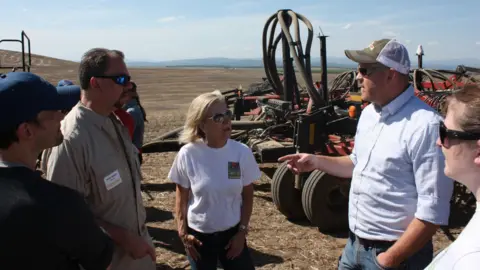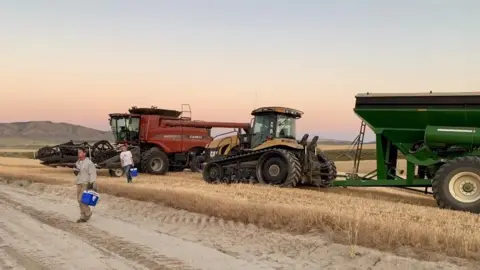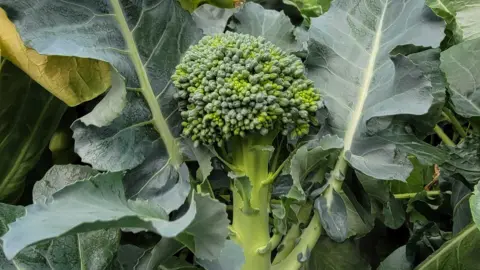from Suzanne Bearne, Business reporter
 The grain of the shepherd
The grain of the shepherdLike the bosses of many food companies, Jeremy Bunch is concerned about the impact of climate change on his business.
“Weather and climate is probably the number one risk for our company,” says the boss of American flour firm Shepherd’s Grain.
Based in Idaho, the business sources wheat from farmers throughout the US Pacific Northwest.
As weather patterns become more unpredictable, Mr. Bunch says, “I need to have a plan B and plan C, in case plan A fails.”
To help bolster those plans, Mr. Bunch’s company is now using an AI-powered software system called ClimateAi.
Using current and past data, such as satellite imagery and temperature and rainfall readings, and combining it with future forecasts, ClimateAi aims to give farmers the most accurate, locally tailored weather forecasts possible. from one hour to six months ahead.
It then advises exactly when to plant and harvest specific crops and predicts their yields.
Shepherd’s Grain only started using ClimateAi last year, but already most of its 40-plus farmers are now being guided by the app.
“They’re starting to look at ClimateAi to help them plan crop management decisions in their wheat crops, the main crop grown in the region,” Mr Bunch says.
“A look ahead to the weather helps our growers decide which crops to plant. The platform knows when to plant and when the crop will start flowering and producing seed.”
One of the biggest problems facing the seed industry is how to get climate-resistant seeds to market faster and cheaper, says Himanshu Gupta, chief executive of San Francisco-based ClimateAi.
“By the time some seed companies do this, say in 10 to 15 years, the climate has already changed,” says Mr Gupta. “We are racing against time to launch new seed varieties.”
He says ClimateAi helps these firms see how specific test seeds have performed in a given region or locality. “This can help seed companies understand the optimal locations for growing seeds.”
 The grain of the shepherd
The grain of the shepherdLast year, a study published in the scientific journal Nature warned of the potentially dire consequences of multiple crop failures occurring simultaneously around the world as a result of the impact of climate change.
“Simultaneous harvest failures in major producing regions are a threat to global food security.” the report states, which was led by climate scientist Kai Kornhuber of Columbia University’s Lamont-Doherty Earth Observatory.
The warning comes as the world’s population is expected to reach 10 billion people by 2050, up from eight billion currently, according to the United Nations.
With growing pressure on crops at the same time as the global population continues to grow, could artificial intelligence be key to developing new varieties that can better withstand extremes of weather?
In the Tanzanian city of Arusha, David Guerena, an agricultural scientist at the International Center for Tropical Agriculture, is leading a project called Artemis.
Funded by the Bill and Melinda Gates Foundation, it’s using AI to help grow more resilient crops. In particular, AI is helping to speed up work called phenotyping.
This is the visual study of new crop varieties based on observations of their characteristics, such as how many flowers, pods or leaves a plant has.
“Traditionally it takes about 10 years to develop a new crop variety,” explains Mr. Guerena. “But given the pace of climate change, that timeline is no longer viable.”
He adds that phenotyping work traditionally relied on the human eye. “But people just aren’t doing it consistently, with the high levels of precision needed, to make subtle but important plant choices,” says Mr Guerena.
“It can be over 30˚C in the field. It’s just tiring, and tiring affects data quality.”
Instead, growers involved in the project are taking pictures of their crops through an app on a smartphone. The trained AI can then quickly analyze, record and report what it sees.
“Computers can count every flower or spike, from every plant, every day without getting tired,” says Mr. Guerena. “This is really important as the number of flowers on bean plants is related to the number of pods which directly affects yields.
“The data can be so complex, to understand what’s going on, but AI can be used to understand that complex data and get patterns, to show where we need resources, to show recommendations.
“Our plant breeders estimate that with better data from AI computer vision, they may be able to shorten the breeding cycle to just a few years.”
 Avalo
AvaloIn North Carolina, Avalo is an agricultural technology or “agri-tech” business that also works to create climate-resilient crops. It does this by using AI to help study the genetics of a crop.
“Our process starts with genomic data for crops, for example, the sequences of different varieties,” says Rebecca White, Avalo’s chief operating officer.
“For example, with different tomatoes, there are some small changes in the genome that give them different traits, for example different flavors, pesticide resistance profiles. Our machine learning program is able to take these small differences across a number of varieties and see which genomes are important for which traits.”
Using their technology, they have been able to create broccoli that matures in a greenhouse in 37 days instead of the standard 45 to 60 days, Ms White says.
“Broccoli produced on that time scale can have additional growth cycles and save the carbon footprint and improve the environmental impact.”
Avalo, which works with companies in Asia and North America, is also working to make rice frost-resistant and potatoes more drought-tolerant.
“Our core technologies can identify the genetic basis of complex traits with minimal training and, through sequencing and predictive analyses, quickly and cost-effectively evaluate and model new plant varieties,” says Ms White.
“We are creating new varieties for different crops that develop five times faster and at a fraction of the cost compared to traditional breeding.”
However, while AI can help mitigate the impact of climate-related weather and increase crop resilience, there are a number of challenges when it comes to using AI in agriculture, says Kate E Jones, professor of ecology and biodiversity at University College London.
“The effectiveness of AI in ensuring food security also depends on addressing challenges such as data quality, access to technology… while recognizing that AI is one tool among many in a comprehensive strategy for sustainable and resilient agriculture.”
